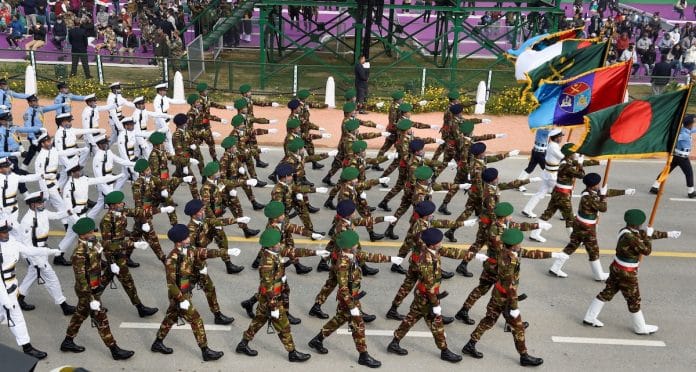There has been a snag in Bangladesh’s relationship with India after the fall of the Sheikh Hasina government. Caretaker to Bangladesh’s interim government Muhammad Yunus has accused India of spreading ‘fake news’ against his country, and Bangladesh’s growing closeness to Pakistan has made India wary.
But one thing Bangladesh should still learn from India and not borrow from Pakistan is how to keep the army at arm’s length from its domestic politics. Especially since Bangladesh has already paid a heavy price in 1977 by not doing so. But it seems to be veering toward that path again. Fifteen officers have been taken into custody for crimes against humanity and more detentions may follow.
Action against the army
On 11 October 2025, the Bangladesh press reported that the Bangladesh army had taken 15 of its officers into custody. This is after warrants were issued against 30 officers over alleged involvement in enforced disappearances and crimes against humanity. Of the suspects, 17 were allegedly involved in torture at an interrogation cell, while 13 others face charges involving abuses inside an interrogation cell.
These are no doubt grave charges and deposed prime minister Sheikh Hasina has been named as the key suspect in both cases. Among those facing charges are her defence and security advisor retired Major General Tarique Ahmed Siddique and five former heads of the Directorate General of Forces Intelligence, Bangladesh’s military intelligence division.
Twenty five of those charged are either serving or former army officers. Of them, nine are retired, one is on post-retirement leave, and 15 are currently in service.
The development has shocked Bangladesh, divided the Bangladesh army and forced Army chief of staff General Waker-uz-Zaman to cancel his five-day visit to Saudi Arabia fearing trouble within the Army.
According to Bangladesh expert Subir Bhaumik, General Waker is caught between a rock and a hard place. If he fails to prevent the prevent the accused officers from being dragged away in prison vans, he risks the wrath of his subordinates, some of whom now openly accuse him of being too soft on Yunus.
“On the other hand, if he moves strongly to force Yunus and the International Crimes Tribunal chief prosecutor to concede trial in military courts and they refuse, he is left with no option but to go for a military takeover by getting the president to declare an Emergency,” Bhaumik wrote.
While nobody is saying that grave crimes like custodial torture and enforced disappearances should not be investigated, even if they have been perpetrated by army officers, misusing the army for domestic affairs seems to be a continuing trend in Bangladesh.
On 16 July this year, reports on political clashes in Hasina’s hometown, Gopalganj, reached the United Nations after the army allegedly opened fire on Awami League political activists, killing four and injuring many.
An independent non-governmental organisation, the International Crimes Research Foundation, urged the UN to hold the Bangladesh army accountable under international law for any violations of human rights, including extrajudicial killings and torture.
But no action has been taken against any army personnel for the Gopalganj incident so far. Bangladeshi journalist Sahidul Hasan Khokon told ThePrint that with every passing day the army is being dragged deeper into a quagmire of internal politics.
“This may soon lead to a national security crisis stalling the next round of elections,” Hasan said.
Also read: Tarique Rahman was once the face of corruption. Now he could help save Bangladesh
Learning from 1977 horrors
Bangladesh should not forget the popular saying about its newfound friend—‘While every country has an army, Pakistan’s army has a country.’ The Yunus administration would do well to not create a situation where the army turns against itself and throws the entire country into crisis. Apart from Pakistan’s example, there are past horrors within the country that Bangladesh should take lessons from.
On 12 December 2022, the Bangladesh press recounted the struggles of families of army and air force officers executed in 1977 by General Ziaur Rahman, who served as the president of Bangladesh from 1977 to 1981. It spoke of Naheed Ezaher Khan who was only five years old in 1977 when she saw her father’s body riddled with bullets. Her father was one among hundreds of military officers executed during Ziaur Rahman’s military regime.
“The murder spree went on following the takeover of Gen Ziaur Rahman who ordered killing, by hanging or on firing squad, of the army and air force officers charged with a coup attempt on October 2, 1977,” the report said.
General Zia, in his six-year stint, oversaw the execution of at least 1,500 of his own officers.
Journalist Zayadul Ahsan Pintu, who has researched the post-1975 killings of the members of the armed forces, said that the then military tribunal judges used to read out pre-written judgments signed by General Zia. Hundreds of mothers, wives, sisters, and brothers made frantic efforts to see or locate the remains of the deceased, but couldn’t. Throughout his time in power, General Zia’s regime engaged in a systematic purge of the armed forces to eliminate perceived threats to his authority.
Finally, it was his own army that assassinated General Zia on 30 May 1981. Like the founding father of Bangladesh and its first prime minister Sheikh Mujibur Rahman was assassinated by a section of his own army on 15 August 1975.
Like in Pakistan, the Army getting caught up in domestic politics and hostile takeovers has only pushed Bangladesh to the brim. With the next round of national elections due in four months, the Yunus administration should take all steps to prevent history from repeating itself.
Deep Halder is an author and journalist. He tweets @deepscribble. Views are personal.
(Edited by Theres Sudeep)






